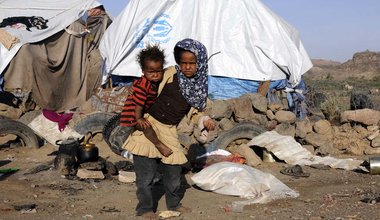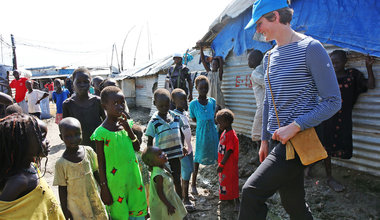United Kingdom to remain ‘outward-facing’ global partner, Prime Minister tells UN Assembly
 Addressing the United Nations General Assembly for the first time, Theresa May, the Prime Minister of the United Kingdom, said her country has always been an outward-facing, global partner at the heart of international efforts to secure peace and prosperity since the first Assembly meeting was held in London in 1946.
Addressing the United Nations General Assembly for the first time, Theresa May, the Prime Minister of the United Kingdom, said her country has always been an outward-facing, global partner at the heart of international efforts to secure peace and prosperity since the first Assembly meeting was held in London in 1946.
“And that is how we will remain,” she said, explaining that when the British people voted to leave the European Union in June, “they did not vote to turn inwards or walk away from any of our partners in the world.”
The outcome of the British referendum led to the resignation of her predecessor David Cameron, who addressed the Assembly last year.
Ms. May said that her Government will honour its commitment to devote 0.7 per cent of gross domestic product (GDP) to official development assistance (ODA), remain a steadfast permanent member of the Security Council and make a leading contribution to UN peacekeeping.
The UK will also complete domestic procedures to enable ratification of the Paris Agreement on climate change before the end of 2016 and will strengthen partnerships for resolving conflicts around the world, she said.
In the face of today’s big security and human rights issues, the United Nations must forge a bold new multilateralism, she said, adding that the Organization must modernize in order to meet the challenges of terrorism in the 21st century.
The UK has played a leading role in the fight against Al-Shabaab in Somalia, will host an international conference on Somalia in 2017, and has championed the work the UN Secretary-General has led to develop a strategy for preventing violent extremism, she said.
Noting that the 65 million forcibly displaced people around the world equalled her country’s entire population, she emphasized that countries must be able to exercise control over their borders. Refugees should claim asylum in the first safe country they reached, and there should be better ways to distinguish between refugees and economic migrants. A better overall approach to managing economic migration is needed as well, she said, adding that by ensuring managed and controlled international migration, isolationism and xenophobia can be rejected.
Turning to modern slavery of human trafficking, she said her Government is creating a task force to coordinate efforts against such cruel exploitation. It is also setting up a dedicated fund for high-risk countries whose citizens are trafficked to the United Kingdom. However, in order to eradicate modern slavery, security relationships must be developed among countries, she pointed out.
Faced with migration and other major challenges, more global action is needed, “so this is not the time to turn away from our United Nations,” she said. “It is time to turn towards it.”
Ms. May is among the many leaders who will address the general debate of 71st General Assembly. The Assembly began its high-level work this year with the adoption of the New York Declaration, as the outcome of yesterday's first-ever UN Summit for Refugees and Migrants. Made up of all the 193 Member States of the United Nations, the Assembly provides a forum for multilateral discussion of international issues covered by the UN Charter.
 UN
UN






